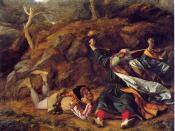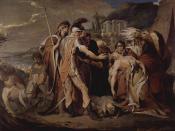Interprets blindness in king lear/oedipus very good, pleasure to read
Tragedy is defined in Websters New Collegiate Dictionary as: 1) a medieval narrative poem or tale typically describing the downfall of a great man, 2) a serious drama typically describing a conflict between the protagonist and a superior force (as destiny) and having a sorrowful or disastrous conclusion that excites pity or terror. The play of King Lear is one of William Shakespears great tragic pieces, it is not only seen as a tragedy in itself, but also a play that includes two tragic heroes and four villains. I felt that a tragic hero must not be all good or all bad, but just by misfortune he is deprived of something very valuable to him by error of judgment.
We must be able to identify ourselves with the tragic hero if he is to inspire fear, for we must feel that what happens to him could happen to us.
If Lear was completely evil, we would not be fearful of what happens to him: he would merely be repulsive. But Lear does inspire fear because, like us, he is not completely upright, nor is he completely wicked. He is foolish and arrogant, it is true, but later he is also humble and compassionate. He is wrathful, but at times, patient. Because of his good qualities, we experience pity for him and feel that he does not deserve the severity of his punishment. His actions are not occasioned by any corruption or
depravity in him, but by an error in judgment, which, however, does arise from a defect of character. Lear has a 'tragic flaw' - egotism. It is his egotism in the first scene that causes him to make his error in judgment - the division of his kingdom and...


